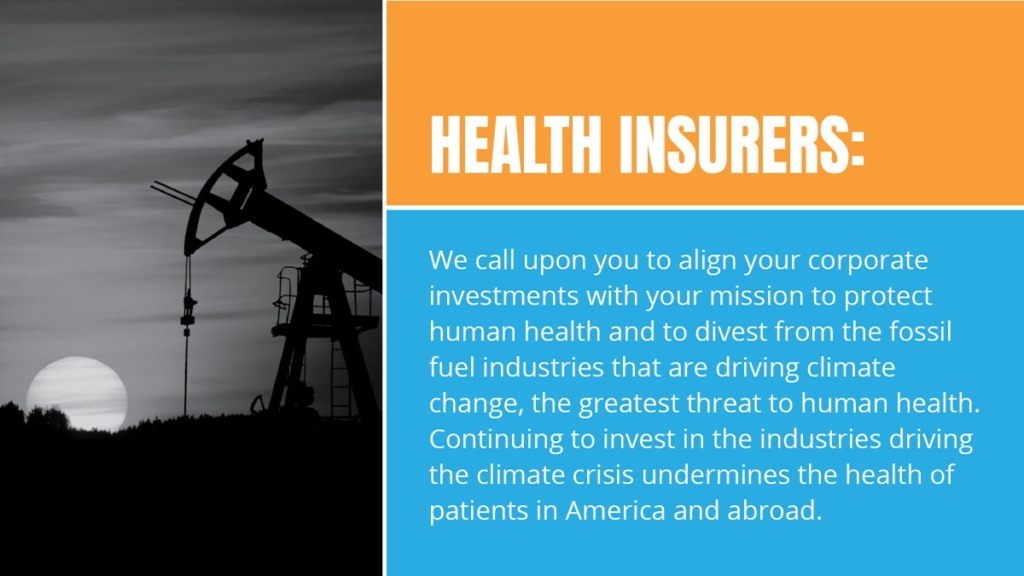Analysis finds top health insurers hold US$24 billion in coal, oil, and gas

OAKLAND, CA (October 14, 2020)— In a letter sent today, a group of around 60 health and environmental groups called on the US health insurance industry to divest from fossil fuels.
The health impacts of fossil fuel pollution and climate change—which is largely driven by fossil fuels—“dwarf every other human health threat the world faces,” the letter reads.
The top 10 US health insurance companies that have publicly available investment data—including Cigna, UnitedHealth, Anthem, and Aetna—have US$24 billion invested in fossil fuels, according to new analysis from Physicians for Social Responsibility and Insure Our Future released alongside the letter.
The letter comes during a year when Americans have faced both the COVID-19 pandemic and the health impacts of record-breaking wildfire and hurricane seasons. It builds on the growing movement to persuade the broader insurance industry to stop supporting fossil fuels.
“Extracting and burning fossil fuels damages our respiratory, cardiovascular, and nervous systems and wreaks damage on the environment. It also drives climate change. How can health and life insurance companies rationalize supporting such life-damaging activities? They shouldn’t,” said Barbara Gottlieb, Director of Environment & Health at Physicians for Social Responsibility.
“As an emergency physician, I am troubled that health insurers are investing in fossil fuel companies which directly harm human health and contribute to the climate crisis. It is time for these companies to align their investments with their healing mission by divesting from industries that harm public health and the overall health of the planet,” said Amy Collins, MD, Senior Clinical Advisor for Physician Engagement at Health Care Without Harm.
The analysis, “Running Out of Time: Why US Health and Life Insurance Companies Should Divest from Fossil Fuels,” notes that there is precedent for divesting from industries that threaten health: many health and life insurance companies have divested from tobacco companies, for example, acknowledging the hypocrisy of supporting an industry with such severe health impacts.
It also lay out the monumental health risks of climate change and fossil fuels: more devastating floods, storms, and wildfires, as well as higher temperatures, contribute to higher rates of death and disease. Air pollution, largely the result of burning fossil fuels, kills around 8.8 million people annually worldwide. A recent Harvard study found that long term exposure to air pollution also increases the risk of death from COVID-19.
Both the letter and analysis note that the health harms from exposure to fossil fuels disproportionately burden low-income communities and communities of color. Exposure to infrastructure, including coal plants, oil pipelines, and refineries contribute to higher rates of severe childhood asthma and death from cardiovascular and cancer-related illnesses among communities of color.
“The climate crisis is an existential threat to the health and safety of every single person on this planet. This is why I am part of a coalition led by doctors, nurses, and other health professionals calling on health insurers to divest from the coal, oil, and gas corporations that are making our patients sick,” said Ashley McClure, MD and founder of Climate Health Now. “There is a major conflict of interest that must be remedied, when the fossil fuel investments of health insurers are making people sicker so they have to rely more on their health insurance.”
“In the US, there are 200,000 premature deaths a year due to air pollution, which is primarily caused by the extraction and combustion of fossil fuels. These are lives we can save by divesting from fossil fuels,” said Karina Maher, MD, of Climate Health Now. “Pollution from fossil fuel combustion is also the leading environmental threat to children’s health and a major contributor to global inequality and environmental injustice. These are all problems we know how to solve if we act now to shift our economy away from fossil fuels.”
“We call upon you, as health insurance industry leaders, to align your corporate investments with your mission to protect human health and to divest from the fossil fuel industries that are driving climate change, the greatest threat to human health,” reads the letter, which was signed by 60 organizations including Health Care Without Harm, the American Medical Student Association, Greenpeace USA, and Mazaska Talks. It was organized by Climate Health Now, Medical Students for a Sustainable Future, and Insure Our Future.
Over 100 financial institutions—including over 30 insurers worldwide-—have pledged some divestment from fossil fuels. But among US health and life insurers, thus far only MetLife, which provides both types of insurance, has taken steps toward restricting some investments in the coal and tar sands sectors. Advocates say the company needs to go further.
The investment data also looks at life insurers, but advocates focused their demands on health insurers due to the clear contradiction of health insurers investing in industries that threaten human health. The data is based on self-reported figures from the California Department of Insurance Climate Risk Carbon Initiative. The latest figures are from 2017, but have never before been cross-referenced with a focus on top tier insurers.
Citing the Intergovernmental Panel on Climate Change (IPCC), the letter notes that the world is already 1 degree Celsius warmer than pre-industrial levels; reaching 1.5 degrees would increase the risk of “drought, floods, extreme heat and poverty for hundreds of millions of people,” along with “worsening air pollution, food and water shortages, increased prevalence of infectious diseases, extreme weather events, and significant social, economic and political upheaval.”
***
Climate Health Now is a group of doctors and health professionals based in California who recognize climate change as the public health and equity emergency of our lifetimes. We mobilize the trusted voice of health professionals to advocate for a rapid, just transition off harmful fossil fuels toward a healthy, equitable society sustained by renewable energy.
Physicians for Social Responsibility is a nationwide organization of physicians, other health professionals and concerned citizens working to protect human life from the greatest threats to human health and survival: climate change and nuclear war. Working through its individual members and 23 chapters across the nation, PSR educates, mobilizes and engages health professionals to secure concrete changes in policy and practices for a healthy planet.



